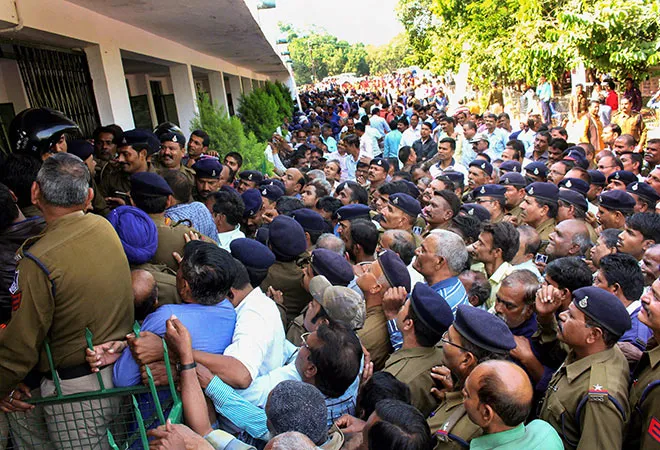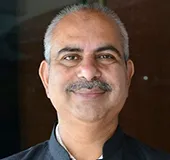
On 28 November, Madhya Pradesh will elect a new State Assembly. And the electioneering has reached high momentum. Amid the electoral slug fest, Madhya Pradesh has some serious issues that have gone unattended by successive political regimes affecting millions in the central Indian state.
While BJP Chief Minister Shivraj Singh Chouhan has won many laurels including ‘Krishi Karman’ award (Commissioner, Agriculture and Horticulture of the Union Government confers this award for wheat production), the winning State gets a trophy, citation letter and a cash reward of Rs. 2 crore. Chouhan received this award five times from the Union Government, including Dr. Manmohan Singh regime) yet, not many farmers in the State want their children to take up the family profession. This is due to huge regional disparity in agriculture production. Out of 52 districts of the State, 15 from prosperous Malwa region contribute over 50 per cent of output. Many marginal farmers in Bundelkhand, Chambal-Gwalior region and in Vindhya Pradesh are losing their land, turning into labourers and out migration has increased in these areas. The farmers’ unrest roiled MP so much so that eight farmers were killed in a police firing in June 2017. Most farm organisations and leaders have been demanding loan waivers and government guarantees for higher crop prices.
As per a survey by the National Sample Survey Organisation, over 32 lakh farmers are in debt in Madhya Pradesh. As per one estimate, on an average, each farmer in the State is under a debt of Rs. 14,128. In 2017, bumper crops saw glut in the prices of tomato, onion and potato, leading to distress sale. Madhya Pradesh Chief Minister Shivraj Singh Chouhan, however, opposed any loan waiver scheme and opted for a “Bhavantar Bhugtan Yojna’’ for making good to farmers the shortfall between price paid and declared MSP, especially in soyabean and wheat. Chouhan had to request the Union Government to bail him out with funds to the tune of Rs. 1,900 crore that he had spent on the “Bhavantar Bhugtan Yojna.’’ scheme. Many small and marginal farmers in Madhya Pradesh continue to grapple with loss-making prices for their farm produce, mounting loans (high interest rates on private loans), high costs of inputs, exploitative middle men, high mandi taxes, high cost of labour, lack of market linkages, lack of de-centralised storage capacity, cold storages and a range of related issues.
Unemployment
Madhya Pradesh is staring at very high rate of unemployment simply because a vast workforce that is engaged in agriculture cannot be absorbed in industrial and tertiary sector without human development. As per Madhya Pradesh State Assembly records, on an average, 17,600 jobs have been created every year in the State since the BJP came to power in the State in December 2003. The Economic Survey presented in 2017 admitted that the number of educated unemployed stood at 11.24 lakh by the end of 2016. The Chouhan government has drawn flak for raising the retirement age of its employees to 62 from 60 years as it will reduce employment opportunities for unemployed youth. As per the data tabled in Madhya Pradesh assembly, 2,46,612 jobs were generated in the state between 2004 and 2017. Of these, 2,27,386 jobs came from the private sector.
Berozgar Sena, a voluntary outfit fighting unemployment in Madhya Pradesh, claims that unemployment has gone up by 53% in and unemployment-related suicides have surged 20 times between 2005 and 2015.
Human resource development
In spite of its proximity to the national capital region, skill development has remained ignored for many years both in terms of Industrial Development and New age IT industry.
Climate change
Madhya Pradesh’s Bundelkhand region has witnessed to unpredictable weather conditions resulting in severe drinking water stress. In Gwalior-Chambal region, man-animal and animal-animal conflicts during summer months have become common due to water scarcity.
A study conducted by the IIM, Ahmedabad has indicated that the frequency of severe, extreme, and exceptional droughts has increased in Madhya Pradesh. Droughts in the recent years were severe and wide-spread. The number of hot days has increased significantly in the state. These developments are posing enormous pressure on agriculture, water resources, infrastructure, tourism, and energy sectors. To effectively manage the detrimental impacts of climate change, local level policies are required to check adverse impact of climate change on these sectors.
Urban development
Major cities of Madhya Pradesh have not taken off like other States. Cities are engines of growth, but Indore and Bhopal are struggling to compete with towns like Jaipur, Vadodara, Lucknow or Nagpur. Indore was once considered an automobile hub, but there has been lot of stagnation. According to Sushil Sureka, general secretary, Ahilya Chamber of Commerce and Industries (ACCI), two big economic reforms measures -- demonetisation and Good and Services Tax (GST) – have hurt Indore’s business. As per his assessment, Madhya Pradesh has witnessed a dip of 40 to 50 per cent in businesses and 15 to 20 per cent in unemployment. “Hundreds of small business shops have been shut or are in the verge of shutting down,” Sureka said in a recent interview.
Investor’s summits
The Shivraj Singh Chouhan government held five investor summits between 2007 and 2016, but the move failed to bring much needed investment. As per one estimate, of the 2,357 Memorandums of Understanding (MoU) signed, only 92 projects have been commissioned while more than 1,728 are at early stages of implementation and the rest 537 have been cancelled. In the Global Investor Summit 2016, the government claimed that there has been an intend or interest to the tune of Rs. 5,62, 887 crore from 2,630 companies, but till date, there has been no visible manifestation of it.
A study by the Associated Chambers of Commerce and Industry in India (ASSOCHAM) titled ‘Analysis of Madhya Pradesh: Economy, Infrastructure & Investment,’ observes that poor physical and social infrastructure development has demotivated private sector participation and led to a dismal show in the state’s performance on the investment front.
There are several States sharing border with Madhya Pradesh, but the central Indian State has not made major gains in either mining or cement cluster.
Both the ruling BJP and the opposition Congress in Madhya Pradesh are battling on development plank, offering slew of populist measures for the State assembly polls. But the two principal political parties are silent on issue of providing relief to Bhopal gas tragedy victims, Narmada dam oustees and other marginalised sections of society. They are silent on the plight of the survivors of Bhopal gas tragedy continue to suffer in silence for 34 long years after the world’s worst industrial disaster. Many gas survivors NGOs insist that babies are still born ill-formed in three assembly constituencies of Madhya Pradesh capital Bhopal that were worst affected by the disaster. There are large piles of toxic waste in and around of what used to be the pesticide plant of Union Carbide India. The ground water contamination is reported to be high yet elected representative and those vying for elections have no words or concern for gas survivors. Nearly 570,000 survivors are still suffering due to an indifferent government, a callous health service and meagre compensation.
In official records, it is said that over 3,000 persons were killed on the intervening night of December 2-3, 1984 when over 40 tons of poisonous methyl isocyanate (MIC) leaked from the storage tanks of the Bhopal-based Union Carbide India Ltd (UCIL). But many campaigners working with gas survivors insist that the killer gas killed more than 25,000 people and left 5,50,000 others injured and disabled. The horrific effects of the gas continue to this day but past Congress and BJP governments have been indifferent towards their plight.
The views expressed above belong to the author(s). ORF research and analyses now available on Telegram! Click here to access our curated content — blogs, longforms and interviews.




 PREV
PREV


